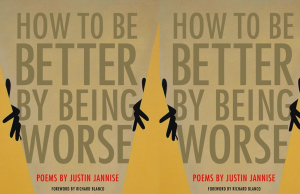Interviews

Interviews,
Head Above Water: How Four Texas Independent Bookstores Fared the Pandemic
Independent (or “indie”) bookstores are one of the many gems that emblazon and attract others to a community. Within their facets, they serve the local economy, bolster the small business industry, add flavor to a locality, and bring people together. Amidst the past year’s whirlwind of closures, layoffs, adjusted work environments, and various other impediments that affect how a community gathers and stays together, they thrived.

Interviews,
Playing at the Edge of Expectation: Mackenzie McGee on Entertainment, Absurdity, and Enjoying a Punch in the Gut
Mackenzie McGee has a habit of referring to her work in the first-person plural. Or so I gather when we meet to discuss McGee’s first “real” short story, to use her words: “Re: Frankie,” an epistolary fever dream of dystopian horror and e-harassment first published here in Porter House Review.

Interviews,
Wahala Visa: An Interview with Nkiacha Atemnkeng
I remember leaving the U.S. embassy feeling hurt, sad and very embarrassed after that first rejection, thinking how I’ll never go back there again. But I was also thinking about what James Baldwin once said: “Because you’ve been hurt, you decide to make your talent important.”

Interviews,
Gwendolyn Brooks, Vulnerability, and JNCOs: A Conversation with Brian Broome
You have racism telling you you’re one thing, telling you you’re worth less than white people. You also, sometimes, have this homophobic masculinity in the Black culture that tells you that you should be this thing. The attempt for “Tabula Rasa” is to say that you don’t have to be any of that. This is your life; you can do and say and be exactly who you are. You don’t have to conform to these standards.

Interviews,
A Conversation with Spencer Reece
“Publishing somewhat later taught me something, or the delay somehow molded me, and little did I realize such a long pause would shape what I would do going forward. It’s not so premeditated, now, at close to sixty as a writer: I just see I don’t get to my truths quickly. That seems to be the point: telling the truth in the art. That’s what I am after, in poems or prose.”
-from Tom Grimes’ interview with poet Spencer Reece

Interviews,
An Interview with Justin Jannise: On How to Be Better by Being Worse
Justin Jannise’s first book of poetry, How to Be Better by Being Worse, was selected by Richard Blanco as winner of the 2019 A. Poulin, Jr. Poetry Prize. While reading it, I was delighted by the way the poems braved emotional, intellectual, and social dilemmas with deftness, wit, and vulnerability. I had questions for Justin […]

Interviews,
The Feminine Mystique: A Micro-Interview with Kathy Bruce
Tapadas, Saints and Other Heroines is the winning work in Visual Art for the 2019 Editor’s Prize contest. In this microinterview, Caroline Frost and Tapadas artist, Kathy Bruce, meditate on the relationship between humans and the natural world, historical archetypes of women, the female form, and Kathy’s artistic influences. In her artwork, Kathy Bruce explores […]

Interviews,
Playing with Space: A Micro-Interview with Tennessee Hill
“I’ve been writing 24/7 for the last 5 years in various academic programs. It’s a total change of pace to focus on myself, my life, my people, and my joy outside of the production and validation of publishing and writing. My project is me!”
